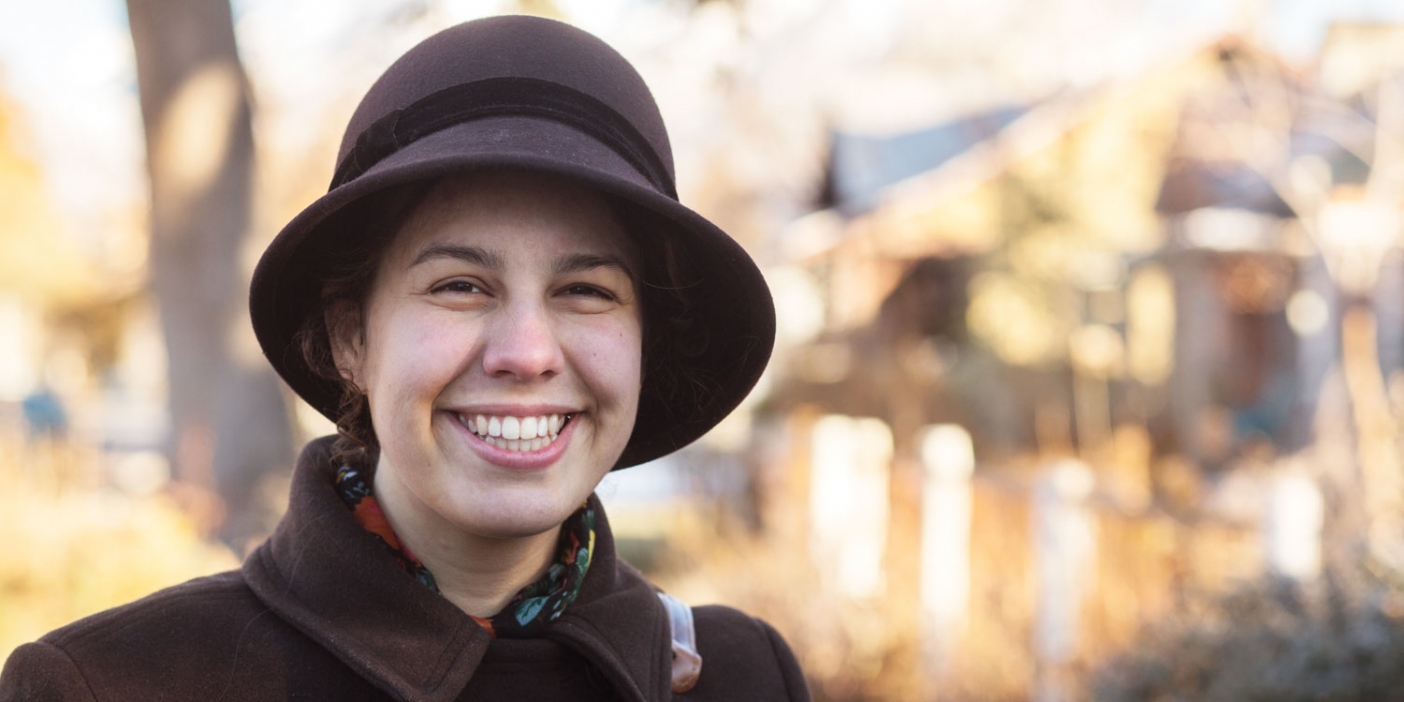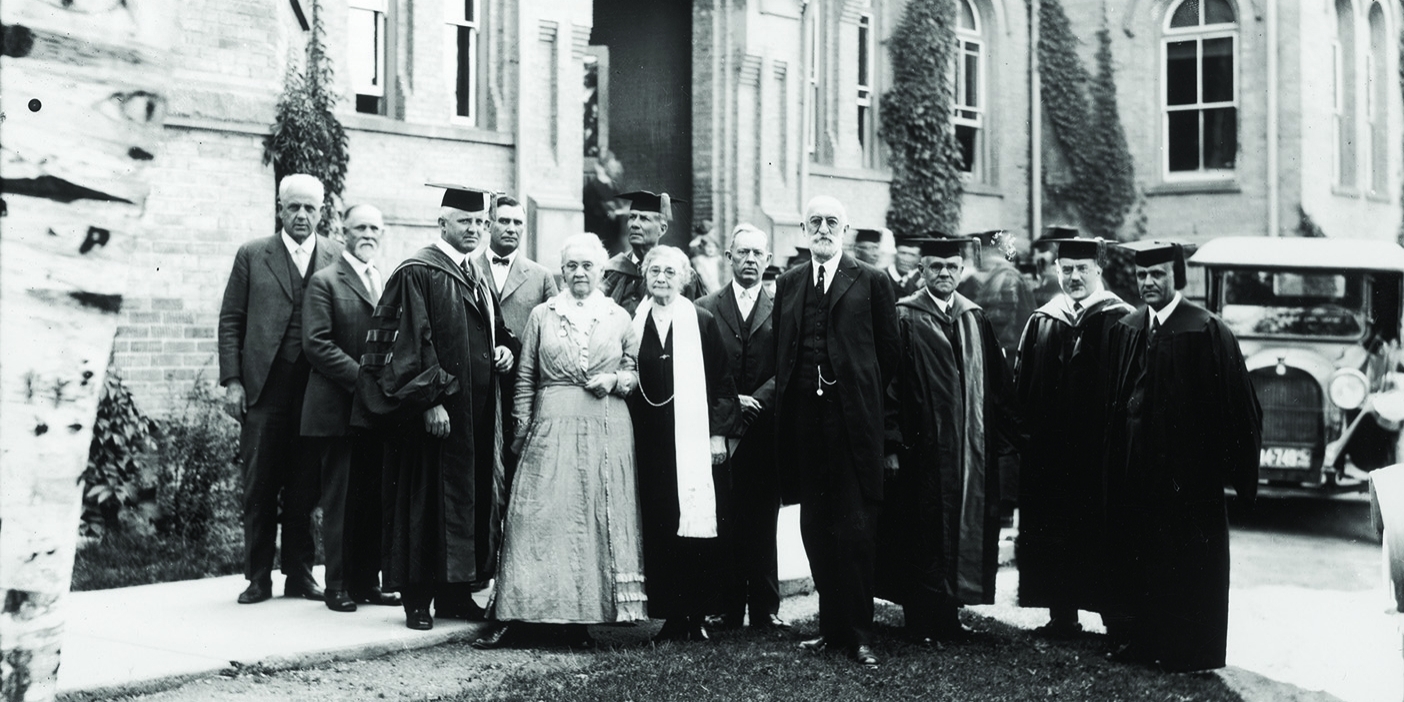Descendents of former BYU president George H. Brimhall contribute to Homecoming each year by hosting an essay competition that gives BYU students an opportunity to learn more about founders who have made significant contributions to the university.
This year participants in the George H. Brimhall Memorial Essay Contest will research Joseph Smith Jr., who has been named the 2005 founder, and be evaluated on their understanding and appreciation of the Prophet’s focus on learning, knowledge, and education.
Six winners will share $3,150, with the first-place recipient receiving $1,000, second-place recipient receiving $750, third-place recipient receiving $500, and three honorable-mention recipients receiving $300 each.
The competition is open to all full-time BYU undergraduate and graduate students. Entries should be about 750 words in length, center on the 2005 Homecoming theme of “Catch the Spirit,” and use insights on Joseph Smith as well as personal reflections. The winning essay will reflect strong writing and the best connection to the founder.
Those interested in entering the contest are welcome to attend a workshop with a contest judge either Thursday, Sept. 8, at 11 a.m. or Friday, Sept. 16, at 3 p.m. in room 123 of the Alumni House. Another help may be the bibliography at the Harold B. Lee Library’s Special Collections; visit sc.lib.byu.edu and select “Search” and “Popular Search Topics.”
Students entering the contest need to download two cover sheets from alumni.byu/saa/brimhall. Participants should then submit two copies of their essays (their names should not appear anywhere on the essays) with the cover sheets before 5 p.m. on Sept. 23.
INFO: Troy Simpson, 801-422-7621
Handel’s Hallelujah
By Alicia Packer
At the end of a taxing day, a music major finds a reason to rejoice.
EDITOR’S NOTE: This essay won third place in the 2005 BYU Magazine student essay contest.
A Thursday in December 2003 was one of those days when classes, work, homework, and extra things to do and places to go seemed to gang up on me—I was emotionally frazzled, physically drained, and anxious for the day to end. My schedule was jammed from morning to night, and throughout work and classes my sleep-deprived mind mulled over my recent decision to major in music education: Was my love of music worth giving up other academic interests and spending hours upon hours in the Harris Fine Arts Center? Was I really devoted enough to music to sit in class picking apart the pitches of a major-minor 7th chord or endlessly tapping a tuning fork? My environment and time were saturated with music—a saxophone crooning in the stairwell, violins creaking in the practice rooms, daily Women’s Chorus rehearsals—but it was devoid of the fulfillment I had experienced before I became a music major. I spent the day wondering if my immersion in the School of Music had destroyed my enjoyment of music.
The end of the excruciatingly long day was finally in sight. I took the stairs two at a time after my last class and arrived panting in the de Jong Concert Hall for the Celebration of Christmas dress rehearsal. The orchestra was practicing on stage, and the hall was packed with singers. I found my fellow Women’s Chorus altos—we were stuffed into a dark space at the back of one aisle, facing the stage. Backpacks and coats littered the seats, and hundreds of choir members chatted onstage and in the opposite aisle. The whole raucous mess reminded me of my state of mind. I was stressed-out. I was hungry. The demands of the music program were wearing my devotion to music thin.
As I complained about my day to a friend, the orchestra conductor hollered at the choirs to be quiet and get ready to sing. The combined choirs and orchestra would be performing Handel’s “Hallelujah Chorus.” The dress rehearsal was our first time combining the singing and the orchestral accompaniment. I had been excited to sing that beloved anthem with full orchestra, but in my cynical mood the prospect that night seemed cliché and contrived. I didn’t know the alto part very well, but we were allowed to hold music. Rustling paper replaced the chatter as singers got out their scores. I searched for mine, but couldn’t find it. I panicked as everyone else in the hall awaited the signal to sing.
A moment of anticipatory stillness, then the conductor gave the cue. As the choirs began to sing over the strings, I started to cry.
A friend turned to me in surprise and whispered, “Alicia, what is wrong?”
I whimpered, “I can’t sing the ‘Hallelujah Chorus.’ I don’t know how.”
She chuckled and urged me to “just sing.” In a quavery voice, I joined the sopranos on the melody: “Hallelujah! For the Lord God omnipotent reigneth. . . . King of kings, and Lord of lords.” By the last sustained shout of praise, I was singing full voice with my friends. “Hallelujah!”
All the stress and worry of the day melted away in the fervent chorus of glory to God. A day’s worth of hasty half-prayers in restroom stalls could not compare to the reverent adoration that filled me in the de Jong.
God reigned when Handel penned the music that accompanied those lines nearly three centuries ago, and he still did that December day amidst my frustrations, the ridiculous tap tap tapping of the tuning forks, and echoes from the music practice rooms. What a poignant reminder that music is much more than a conglomeration of major-minor 7th chords and endless do-re-mis. Handel showed me how music can glorify God and soothe the soul. Like Handel, I wanted to be an artist and a disciple. I resolved to keep singing.
Hallelujah.
Alicia Packer is a senior majoring in music education from Gilbert, Ariz.
Ordinary Forks and Ordinary Folks
By Melissa Draper
A chemistry major discovers that—in things and people—there’s often more than meets the eye.
EDITOR’S NOTE: This essay won second place in the 2005 BYU Magazine student essay contest.
“Do you have a pickle?” I asked as my next door neighbor opened her door. Like an echo I could hear my roommate asking the same question three doors away. “We only need one,” I continued in the same breath, hopping back and forth from one foot to the other to keep my bare feet from going numb on the cold cement. As my neighbor rummaged through her refrigerator, images of warm, fuzzy socks raced through my mind.
My roommate’s voice rang out from down the street: “I’ve got one!”
“Never mind,” I blurted. “Thanks!”
My neighbor laughed, shaking her head. “What did you want it for?”
Already racing toward my apartment, I called back, “We’re making it glow!”
Glowing pickles: I had mentioned the idea to my roommates and, after discovering a pickle famine in our own apartment, we had embarked on a spontaneous pickle hunt. Now I stared down at the jumble of components for our experiment accumulated in our kitchen. The warty pickle was dripping yellow juices onto the counter alongside two dingy dinner forks and a stripped extension cord revealing tiny copper tongues.
For a senior in chemistry, making pickles glow is far from a new trick. But I always got a kick out of it, maybe because it reminded me of my freshman year.
Being a first-year college student is like being a baby, with everything new. Whether it’s discovering manna in the form of Marshmallow Mateys or finding just the right place to take a nap under the Benson Building display cases there’s something to
learn every day. Even now as I get ready to graduate, my brain crammed with chemical constants and facts, I realize that the most important lessons I learned at BYU were in Carroll Hall my freshman year.
The first time I ever made a pickle glow was in our little freshman kitchen. Clark and Nathan were decapitating Rice Krispies snowmen, while Liz and Susie lounged on the couch, giggling about plans for the upcoming Christmas break. Smiling at the thought of going home soon, I wrapped the copper ends of the extension cord around the handles of two forks and sunk them into a pickle.
“OK, everyone—LOOK!” I plugged in the extension cord, then jumped back. After a second of sputtering, the pickle began glowing an eerie yellow-orange color, the consequence of exciting sodium atoms. Everyone laughed, ignoring the faint stench of burned pickle.
I don’t remember exactly what happened next, but I must have become distracted. I do remember thinking that the forks looked very ordinary, though. Maybe I expected forks with 120 volts between them to look different, but they didn’t. They looked like normal flatware. Somehow I ended up close enough to touch one of the forks.
“I can’t let go!” I tried to scream, as fingers that had only brushed the fork suddenly clamped around the handle.
“I’m going to die.” The notion punctuated a murky swirl of thoughts as I realized I couldn’t breathe, couldn’t move, couldn’t hear. Everything looked strange—like a mirage. My chest felt funny. No finals; no going home for Christmas, I thought.
Suddenly the forks clattered to the ground, and I stumbled backward, gasping for breath. Circuit breakers are wonderful things!
“You’re green!” one roommate exclaimed, coming back in from the lobby where she’d run for help. “Are you OK?”
“I’m fine, I’m fine,” I muttered, shaking.
I reached out a tremulous hand to pick the forks up from the floor. Just ordinary forks. Just normal flatware.
“And it’s really going to glow?” My roommate’s question brought me back from freshman-year memories. I nodded, looking hard at the fork tines as I eased them into the back of the pickle. Ordinary forks.
Those freshman forks taught me many things. Along with causing me to be more careful with electricity, they got me thinking about many of the ordinary people I’d met during my years at BYU. Despite appearing completely normal, many of these people have concealed within them breathtaking power to affect me and other people. Like forks in a pickle, in my college experience, it was sometimes the seemingly least spectacular person who influenced me and acted as a conduit to bring out hidden color and unexpected light into my life. There was the Relief Society president who came to our aid when our apartment flooded. Or roommates who laughed and listened. There was the professor who let me join his lab group, deepening my love for chemistry in a million ways. There were the friends who smiled and didn’t get discouraged as they stood on the sidewalk watching their apartment disappear in flames. There had been so many ordinary friends, teachers, and leaders who have deepened my BYU experience without ever expecting plaques and praises in return.
“Ok, everyone—LOOK!” I plugged in the extension cord, then jumped back. After a second of sputtering, the pickle began glowing an eerie yellow-orange color, filling the room with light.
There’s no such thing as ordinary forks—or ordinary people.
Melissa Draper is a chemistry major from Chanhassen, Minn.









